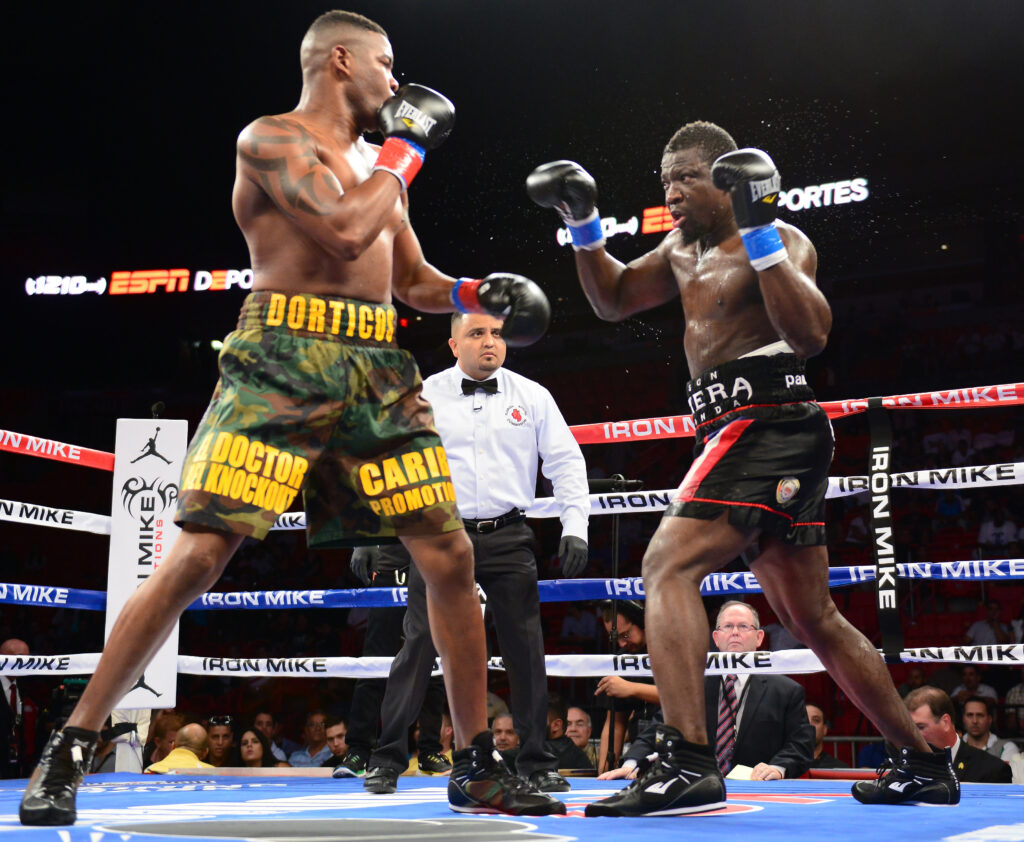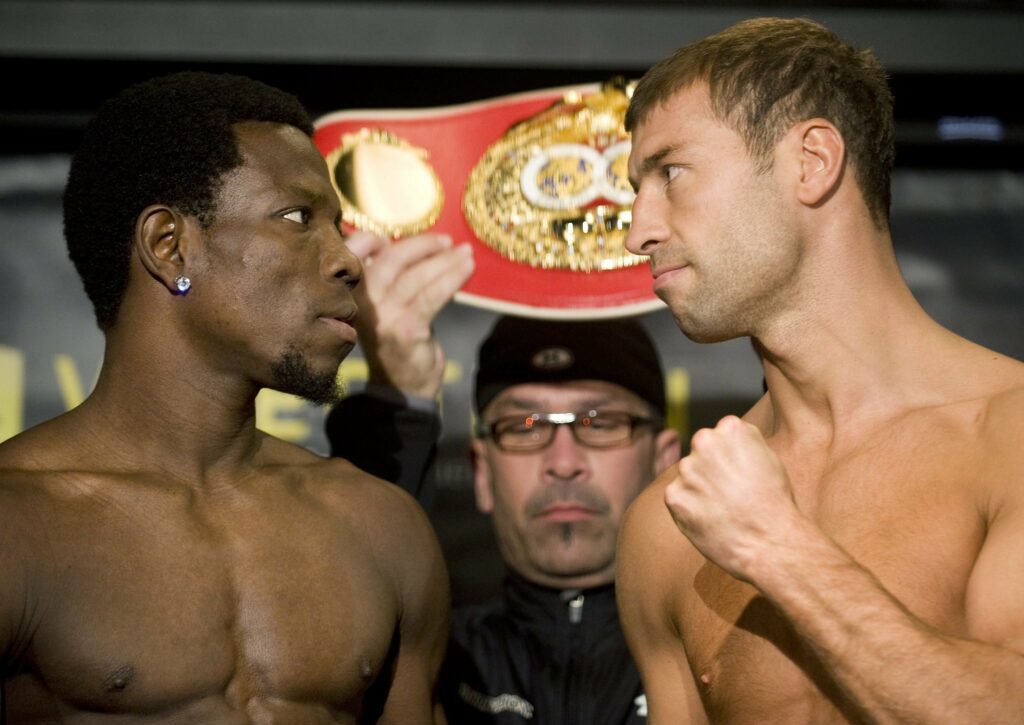Fingers tap the walls of this cell; those hands that paid the bills are now redundant, marking every minute with the motioning of scarred knuckles. Regrets often weave their way between the bars, sleek and smooth, like sewing needles.
Choices made – often in haste or fear – have led to an abundance of time. And you can pace the harsh, concrete floor if you want to, but it won’t occupy much of your day. Or your sentence.
Butner Correctional Facility, North Carolina, housed former mob boss Carmine Persico and infamous Ponzi scheme author Bernie Madoff amongst a host of fellow, high-profile criminals. It was also the home of feared, former middleweight and super-middleweight contender, Edison Miranda (36-10, 31 KOs).
Miranda served almost 18 months for his part in a money laundering and drug dealing scheme that stretched from Puerto Rico to Florida and, on his release, he has kept a relatively low profile. But the fighter, known affectionately as ‘La Pantera’, was far more than orange overalls and yard time.
His story could have been scraped from a discarded Hollywood movie script, deemed too far-fetched for potential financiers.
After tracking Miranda down through his friend and fellow fighter, Billel Dib, Boxing Social spoke to the Colombian about life on the outside and looked back on his exciting career.
“I had a problem with ‘the beast’ – I call that country the beast because they don’t forgive you for anything,” Miranda explained, reeling from his experiences with the American justice system. “I served 18 months in prison and I decided to go back home; back to the place I was born. I think I’m better off here. I’m happy, I feel good. I have friends and people that care for me and I care for them, too.
“I still keep in touch with my friends in the USA and Puerto Rico, and everywhere else. Like Billy [contender Billel Dib], he is Australian and he is a very good friend of mine. I’m back here in Colombia, but I don’t have many people here, because I spent the last 13 years in the USA. So all my friends and family are there.
“Everything is fine here in Colombia though, I’m fine, I’m with my girlfriend. There’s not much happening because of the pandemic, so everything is closed. People are taking care of themselves and staying at home, but we are just working hard to keep going.”
Marching forward stubbornly through adversity isn’t new to Miranda, whether slipping between the ropes or merely surviving on the streets of Buenaventura, Colombia. His childhood wasn’t normal, but he assumed it was.
American boxing author Jimmy Tobin recently profiled that difficult upbringing brilliantly for Hannibal Boxing, detailing Miranda’s mother abandoning her young fighter, just one month after she’d given birth. She was only fourteen. Edison would take to the concrete and find faith in a different family, surrendering himself to the whisper of the streets.
“As a kid growing up, I was naive. I didn’t know much about life. Since I had to grow up without a family, I just thought that was normal, but as time passed I saw other boys with their own moms and dads, and then I realised that I wasn’t normal,” he said.
“I was already used to living on the streets, having to eat from rubbish bins to survive, but I always believed [I could escape that life]. I had faith that everything would change some day and I worked hard to make that happen.
“Now, when I see people on the streets it hurts me. But I also know you need to help yourself, too, because if you don’t do it then nobody else will do it for you. It’s rare in life that people offer you a genuine helping hand. Thank God I could escape the streets because of boxing and now I’m here – still fighting to the end.
“My mom is fine, though,” the two-time world title challenger revealed. “I called her twice today and she is doing okay. Maybe if things had been different with her, I wouldn’t have been famous and I wouldn’t have travelled the world through boxing. Things had to happen the way they did.”
He fought some of the best of his generation, garnering a reputation as a brutal puncher who could spring an upset at every outing. On his biggest nights – fighting Arthur Abraham and Lucien Bute – he fell short. But he deserved more from boxing. Fans and pundits often speak about the “Who needs ’em?” club, and, for a number of years, Edison was the chairman.
He boxed Andre Ward, Kelly Pavlik, Tony Bellew, Eleider Alvarez and Yuniel Dorticos. He didn’t care for politics or preference.

Miranda fancied himself to topple the elite, but he never quite made it. Boxing was his escape from a crippling reality, and bowing out in September 2014 with a hollow victory over a winless Daniel Noguera didn’t quite scratch his itch. Noguera would go on to fight 12 times in total, being knocked out on every single occasion.
“Now that I’m retired, I feel a bit sad because boxing is in my blood but you know everything has to come to an end, so I have accepted it… Boxing was a truly wonderful time in my life, fighting, and I really enjoyed my career,” Miranda told Boxing Social. “I tried to make my fights exciting – no matter if I won or lost. I liked to satisfy the public above anything else.
“The truth is, the hardest part for me wasn’t retiring from boxing, but dealing with my eyesight injuries as a result, especially on the right-hand side. That was the hardest part, because I knew when I started boxing that one day it would all be over. Boxing is like everything in life, one day it will come to an end.
“Overall, I think I’m satisfied with what I have achieved [in my career]. The world got to see how hard I worked. I had wins and losses, like most other fighters. Only a small number have retired unbeaten like [Floyd] Mayweather and Joe Calzaghe, they are extraordinary boxers but I am satisfied with my career. I had 46 fights, with 36 wins and 10 defeats. I fought the best in the world.
“I never asked for and never wanted an easy fight. I always had to fight outside my own country, away from home. Like my fight with Arthur Abraham in Germany. But it doesn’t matter now. It’s over.”
The career of Edison Miranda will stake its place in boxing’s rich history, but where? Now aged 39, he’s made peace with his career, settling into civilian life with his girlfriend, free of American jail cells. Most startlingly, Edison told Boxing Social he just wanted to be, “remembered as a normal guy”. Nothing more, nothing less.

Photo: Graham Hughes/The Canadian Press/PA Images.
In Butner Correctional, his cell reminded him of a locker room before a fight. The concrete, the trepidation, the uncertainty. Pacing up and down, swallowing heavily and occupying his designated bench like toothache, Miranda faced his fears. He didn’t have many left, mind you.
Whether Edison can focus on a life beyond crime (or boxing) remains to be seen, but he’s trying, at least. That prison regime of timed meals and scheduled excercise seemed familiar, though he had no intention of revisiting Butner Correctional. He needed something. Approaching 40 years of age, the Colombian hard man had matured, it seemed.
The time spent cold and covered with a jagged, prison blanket was well spent. He wasn’t going back. But what would he do?
“We have to keep working until the day that we die. But honestly, I’m happy with the work I have done in my career and that’s how I would like to be remembered. Just like an everyday man; a fighter, a warrior.”
It’s the least we can afford him.
Main image: Graham Hughes/The Canadian Press/PA Images.
